HSS-Graduate Seminar Series is a student initiative to serve as a platform for students to share their latest work and receive constructive feedback from their peers. This will not be limited to completed or published work. We encourage presenting your ongoing work as well so that this could become a forum for active and productive academic discussions.
We plan to hold one talk every fortnight, but hope to increase this frequency in the future, depending on the interest and engagement by the students. The speaker will be given 30 minutes to present their work. This will be followed by a critical reflection on the work by a discussant, following which the floor will be opened for questions and comments from the audience. If you have any questions or if you would like to present your work, please contact Coordinator, HSS-GSS – R. Vysakh, PhD scholar, HSS (r_vysakh@iitgn.ac.in).
RECENT SEMINARS
About the speaker:Dr. Tosabanta Padhan is a Post-Doctoral fellow at the Archaeological Sciences centre, IITGN. His principal interest is in Field Archaeology, Ethnoarchaeology, Lithic technology, Experimental Archaeology, Sustainable Heritage and Historical Archaeology. He did his Masters in Quaternary and Prehistory from the University of Trås-os-Montes and Alto Douro (UTAD), Portugal. He earned his Post-Graduate Diploma and Ph.D. in Archaeology from Deccan College, Pune. He has published one book, 20 research papers in reputed national and international journals & presented 32 research papers in various seminars and conferences. He is a recipient of the prestigious H.D. Sankalia Young Archaeologist Award. He has conducted several fieldworks in Central India, Eastern and Northeast India, Western Europe, and East Africa. He taught Archaeology in the Department of History & Archaeology, NEHU, Tura Campus, Meghalaya for few years and was formerly Assistant Professor (2016-17), in the Department of Anthropology University of Asmara, Eritrea (Horn of Africa). Before joining IIT Gandhinagar, He was a former Post-Doc fellow in (UGC) and Israeli Science Foundation (ISF) funded research project at the Indian Institute of Science Education & Research (IISER), Mohali.
Abstract:Burials and grave goods help reconstructing the past way of life, and sheds light on ancient belief and knowledge system. Understanding burial helps understanding the concept of life after death, ancestral worship, nature of the dead, mode of disposals, burial architecture, health, wealth, sex, gender, mortality rate, migration pattern, and socio-economic condition of a past society. Graves are one of the main sources to know the identity, in other words the original place of the inhabitants. Lately with Stratigraphical excavation of the graves and DNA studies, burial archaeology is branching out to be subject of its own. This is an ever evolving subject. The presentation briefly reviews the mortuary archaeology of the Harappan civilization and evaluates various natural and anthropogenic processes responsible for burial destruction. In the last hundred years, numerous Harappan sites have been excavated and uncountable numbers of sites have been destroyed. The present condition of several sites having graves of Harappan period is alarming. Burials and cemetery sites suffer from greater risk, poor conservations, and protection measures. Considering the various factors; a sustainable heritage approach to mortuary archaeology is sought. Careful curation measures, suitable scientific sampling methods, heritage awareness, public outreach programs, and local community participation are the need of the time. Safeguarding the buried archaeological heritage and careful recovery of material remains than excavating the number of burials would enlighten our understanding of the diversity of past cultural, ritual, and symbolic behaviour as well as keep the subject ready for future innovations in understanding the past better.
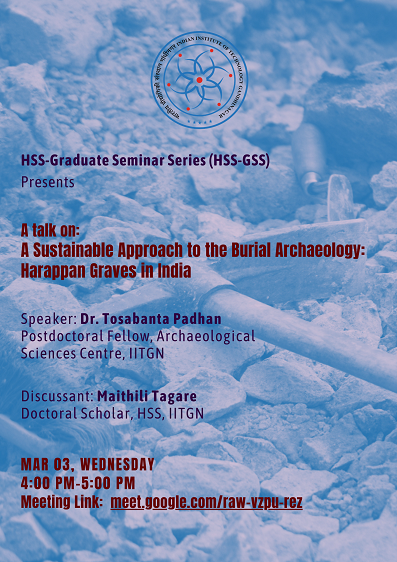
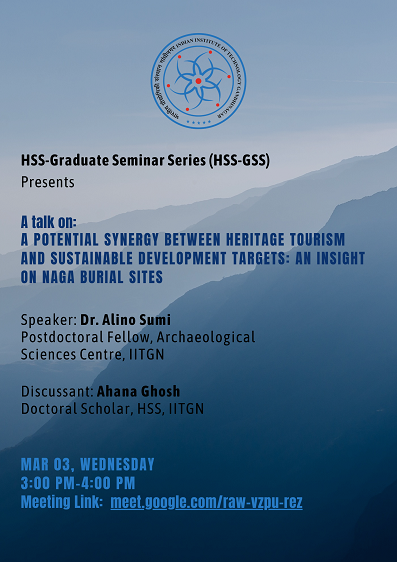
About the speaker:Dr. Alino Sumi earned her PhD from the Martin Luther Christian University, Meghalaya in 2020. She also has certifications in Humanitarian Response to Conflict and Disaster and Environmental Protection and Sustainability from Harvard University and Ben Gurion University of the Negev respectively. Her areas of research interest include indigenous ecological knowledge, tribal studies, gender and environment, natural resource management and environmental and social impact assessment.
Abstract:Graves and burial sites are emblematic reminders of ancestral history; and the Naga ancestors’ share of legacy for what holds sacred to them in preparation for their life’s final journey will be studied through engagement of collective memory as one of the markers for revitalization of cultural identity. It is also considered that the engagement of ecomuseums with the community will help them identify, conserve and celebrate their heritage. It is worth noting that burial sites to foster sustainable development in Nagaland is an untouched sphere and this study is also an attempt to address how the repatriation of Naga patrimonial objects from museums and institutions around the world will bring back respect, dignity and identity of the Nagas while ensuring long-term sustainability, improved-livelihood, local control and renewed interest of their heritage.
About the speaker:Arvind Kumar is a PhD candidate at the RHUL with specific interest in electoral democracy and voting behaviour. His thesis- Caste, Inequality and Voting Behaviour in India explores the role caste and inequality in the rise of right-wing BJP in Indian democracy. His broader research interests include Caste/Ethnic Inequality, Political Behaviour, Party Politics, Political Economy, Political Theory, Judicial Politics and South Asian Politics.
Prior to joining PhD, Arvind Kumar obtained BA(H) in Arabic, MA in Political Science and MPhil in Political Studies from Jawaharlal Nehru University (JNU), New Delhi, and also taught as a Guest Lecturer of Political Science (2016-18) at the Department of Political Science, Satyawati College (M), University of Delhi, New Delhi, India.
Abstract:India has been witnessing growing demand for reservation from various castes/communities. The demand for reservation by the intermediary castes such as Jats, Marathas, Patidars have recently got huge public attention, but there has been a parallel demand from the most/extreme backward caste which have got lesser public attention.
The Most Backward Castes (MBCs) in the northern Indian states particularly in Uttar Pradesh have been demanding their inclusion in the SC category. The castes included in the SC category have historically faced stigma of untouchability, therefore, their inclusion in the SC category has threat of stigmatisation. Despite this, the MBCs have been demanding SC status. In my paper, I investigate the question that why do these castes are demanding SC status? What are the factors which are fuelling this demand and how do these castes plan to overcome from the stigma of untouchability?
To find the answer of above questions, I have conducted interviews of social and political elites of these castes; and I find that the demand for inclusion in the SC category is not new in Uttar Pradesh, it has only been intensified in the last two decades. I argue that the changing social structure of Indian society and prevalent status inequality, are two driving factors which have fuelled this demand.
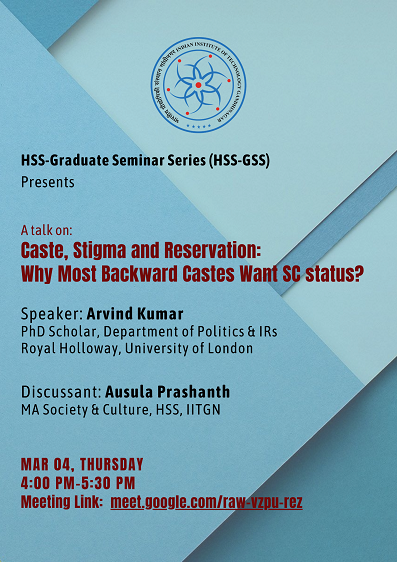
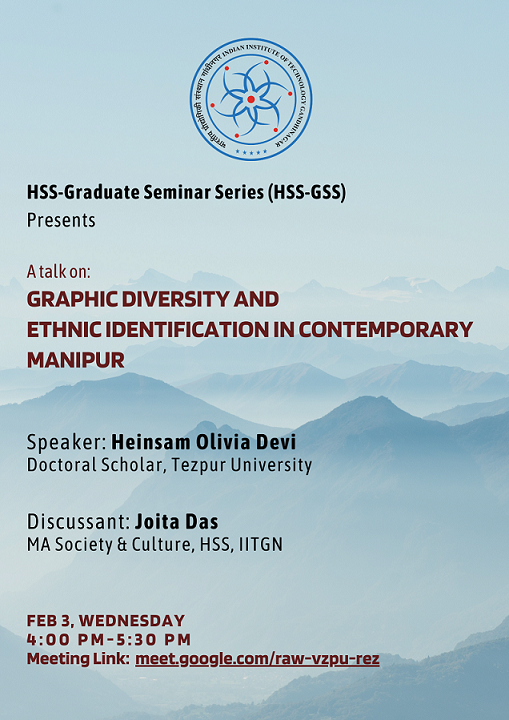
About the speaker:Heisnam Olivia Devi did her graduation in English Literature from LSR, Delhi University and completed her Masters from IIT, Gandhinagar, and she is currently a research scholar at Tezpur University, Assam. She has written on the Rohingya refugees and the scripts in Manipur and her research interest revolves around cultural studies, trans-border studies, gender and identity politics.
Abstract:This article describes how attention to the uses, attitudes, and perceptions of various scripts may provide a dynamic picture of the construction of ethnic identity beyond the framework of ethnic conflict in the northeastern Indian state of Manipur. Currently the languages of Manipur are written in several scripts such as Eastern Brahmi, Roman, Meitei Mayek, and Zo script. Drawing on data collected from interviews of college-age residents of Manipur from different ethnic backgrounds, representatives of cultural organizations in the hills and plains, and from analysis of social, print, and audio-visual media, the article argues that the alignments between script, ethnic identity, and territory are not stable but change in relation to individuals’ or organizations’ positionality towards broader social and political ideologies. In graphically diverse regions such as Manipur, script serves as a semiotic resource through which people can incorporate distinct, but overlapping, ideas of belonging in the construction of ethnic identity.
About the speaker: Anupam Joya Sharma is a doctoral student of Social Epidemiology at the Indian Institute of Technology, Gandhinagar. He is a physicist by training and a Social Epidemiologist by choice. Anupam’s recent works include the inquiry of psychosocial wellbeing and ageing of middle-aged to older queer adults in India, psychosocial effect of the COVID-19 pandemic across social groups in India, intimate partner violence in the aftermath of natural disasters in India, and effects of reservation-based discrimination in Indian institutions. His papers on these topics have been published in reputed journals such as PLoS ONE and Ageing International (Springer). Anupam also works as a Junior Research Fellow (JRF) on a project funded by the Department of Science and Technology (DST) on the impact of climate change on health and vulnerable communities in Gujarat. He is particularly experienced in conducting qualitative interviews, including on sensitive topics, in vulnerable populations such as sexual minorities, socially disadvantaged students, and older persons seeking reproductive interventions.
Abstract: Given the history of caste politics in India, it is not surprising that the socially marginalized students face discrimination, especially after the introduction of the reservation policy (affirmative action) in educational institutes. Our qualitative study, informed by Meyer’s Minority Stress model, analysed in-depth interviews with 30 undergraduate students, 3 faculty members, and 4 administrative officials at a premier Indian university to examine the psychological wellbeing of the reserved category students. We analysed how the discrimination processes contributed to students’ poor academic performance, low self-esteem, and weak motivation. Student group affiliations and university resources created a supportive environment for the socially marginalized, despite a small risk of stigmatization due to enrolment in a few campus support-programs. Moreover, there existed a palpable frustration among the socially privileged students, resulting in discriminatory attitudes against reserved categories but not “lower” caste. Our findings call for the attention of college administrators, policymakers, and the society at large to ensure that well-intended social justice policies are efficiently implemented, to deliver justice to the underprivileged students of India.
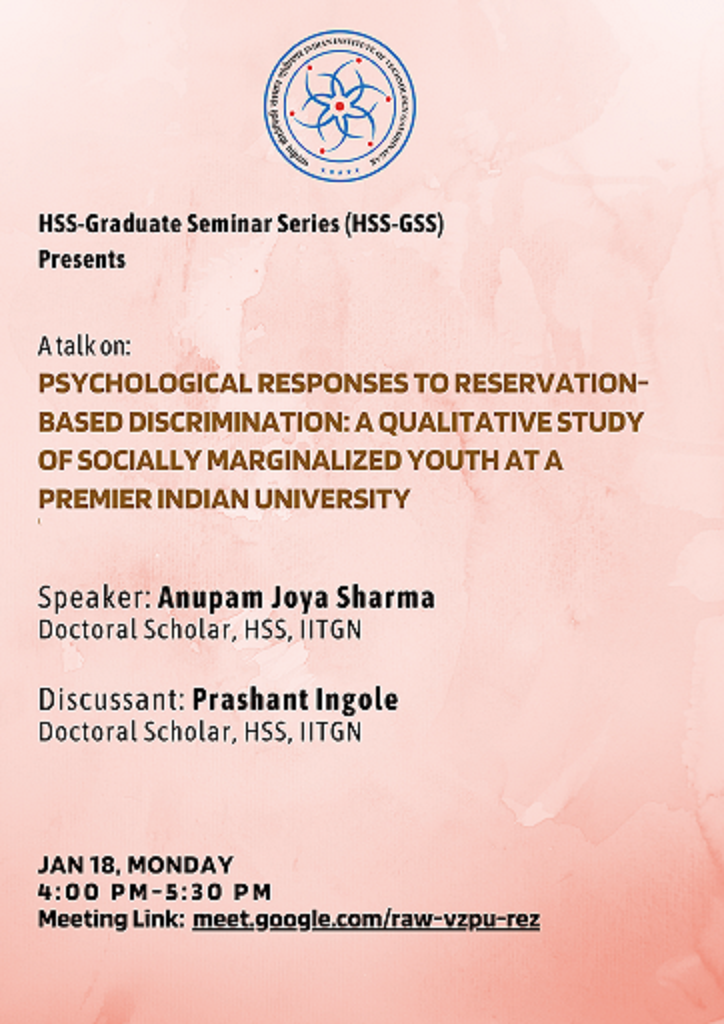
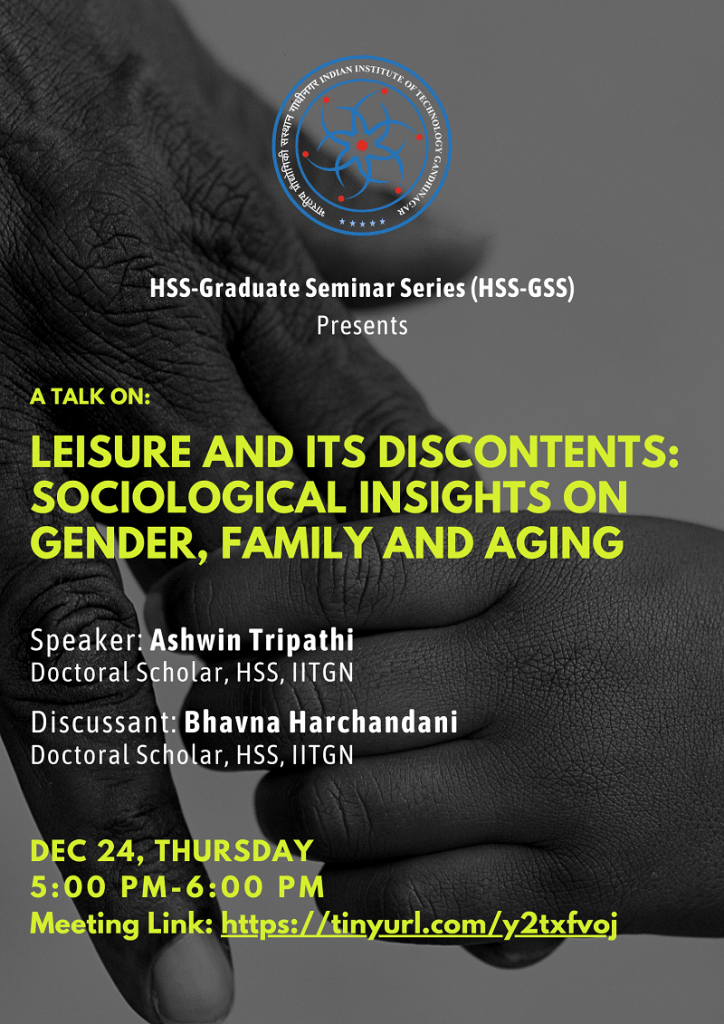
About the speaker: Ashwin Tripathi explores social aging, time allocation, and leisure practices among older adults in her doctoral work. She specialized in Social Anthropology from Queen’s University of Belfast for her MA, where her research focused on the Indian immigrants in the UK and on developing care models within the community. She has also worked as an independent researcher with the Indian Community Centre (Belfast) and ArtsEkta. Her research interests include areas of Social Anthropology, Sociology of Ageing, and Population Studies.
Abstract: We contend that the concept of “leisure” in non-western settings offers a conflation of the productive with the “unproductive” (care and housework) throwing into sharp relief the limitations of traditional measurement indicators. As such, we set out to offer a conceptual framework to understand change and continuity in post-retirement/later life domesticities of middle-class households by focusing on time allocation among older persons. Based on a Time-Use study design that included 24-hour time diaries for a month in urban Ahmedabad (in the western state of Gujarat, India), we show how the household becomes a site of reproduction on inequality in the burden of care and domesticity from a gender and life-course perspective. We contend that the importance of feminist scholarship and family research in addressing these gendered social expectations notwithstanding, there remains a systematic overlooking of the intersection of age with family and care-work in India. Results from our study highlight gendered conceptual incongruence in the meanings of leisure (free time) where older women interpreted free time very differently than men. Specifically, older women’s understanding of leisure remained firmly lodged within the patriarchal demands of care and intimate sociality whereas men’s were reflective of self-expression, freedom and individual choice. Since leisure is known to have crucial links with empowerment, identity and resistance, our conceptual reframing of leisure through the interlocking angles of access, rights and freedom (to pursue “unproductive” pursuits) offer a rethinking of leisure as a political practice in the global south.
About the speaker: Vysakh R is a doctoral student working in the field of Linguistic Anthropology. His research looks at the question of language endangerment in Nicobar Islands. He is also interested in Sociolinguistics, Language Documentation & Description, Language Revitalization, Language Ideologies and the Linguistic construction of identities.
Abstract: This talk will look at the discourse of language loss about Lurö, an Austroasiatic language spoken in Teressa Island, Andaman & Nicobar archipelago, India. Teressa, along with other islands of the Nicobar group, was severely affected by the tsunami of 2004. This talk will propose ways to investigate how this ecological disruption and subsequent changes interact with the discourse about language loss. Speakers claim that Lurö is being replaced by Sanenyö, the language of the neighbouring island. Previous research conducted prior to the tsunami however suggests that there was stable multilingualism in Teressa. This situation does not lend itself to the more obvious explanations of language loss such as dominant language influence, prestige or economic pressures. This talk will delve into the current state of the project, vis-à-vis research questions, relevant literature and preliminary methods.
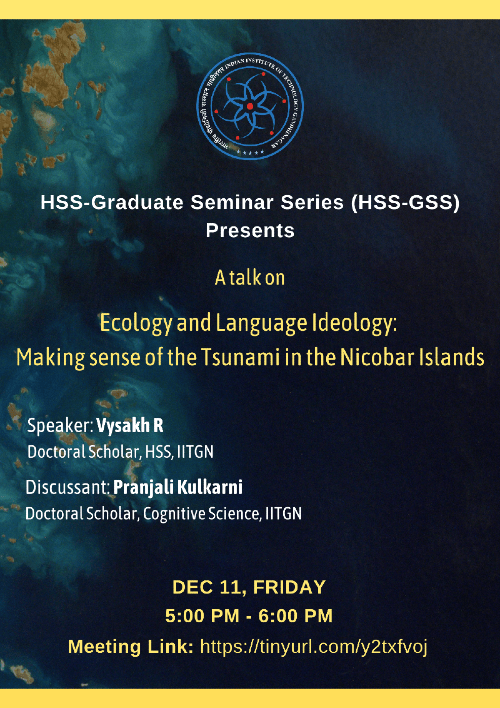
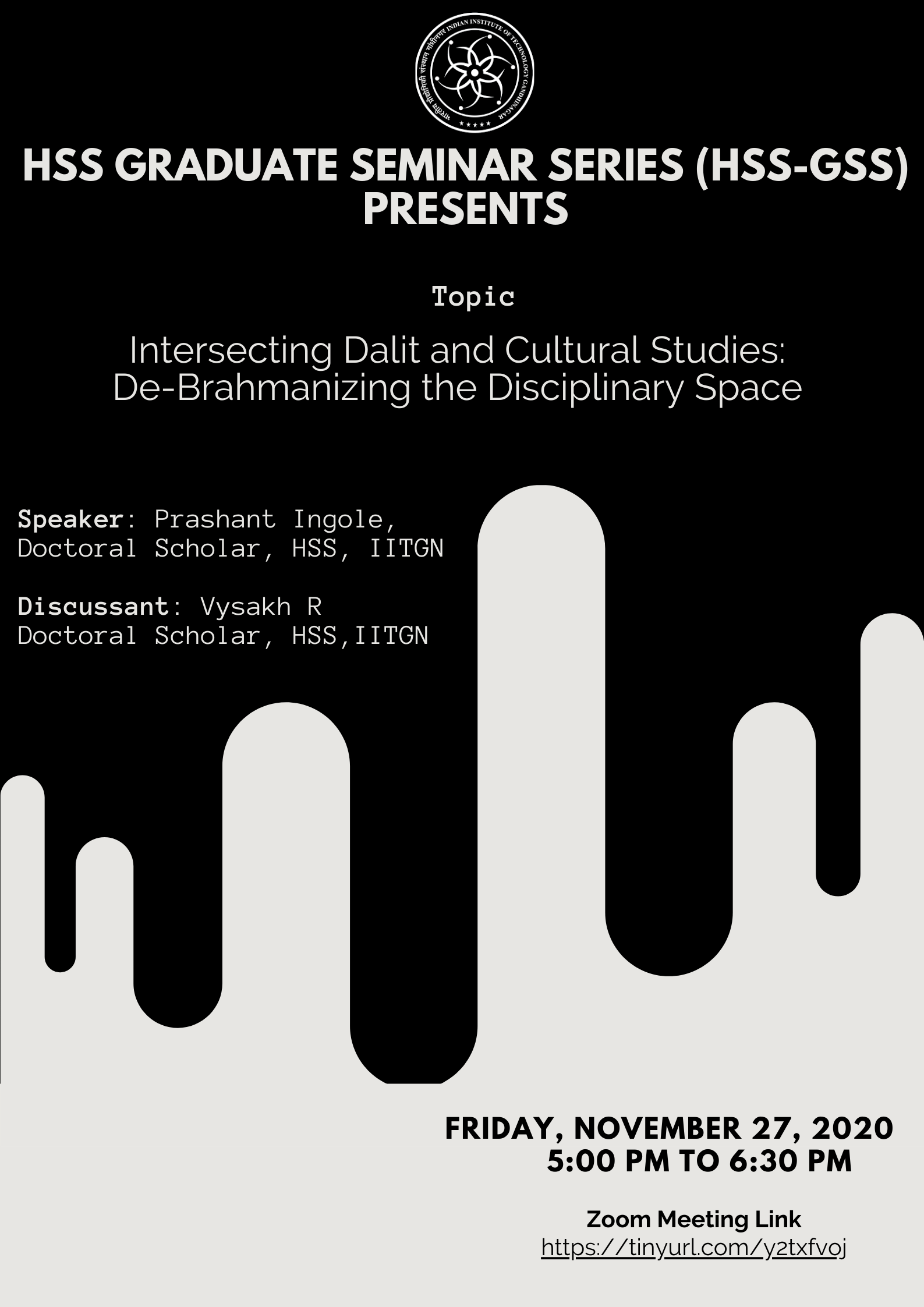
About the speaker: Prashant Ingole is a doctoral student working on Dalit representation and ‘lived’ experience. His research work revolves around graphic narratives, social media, Hindi cinema, and Dalit life narratives. His research interests include literary studies, comparative cultural studies, popular culture, and visual and verbal contexts. He is specifically interested in marginal identities and ground realities with a focus on modern Dalit expressions.
Abstract: This paper is an attempt to synthesis the discipline of Dalit and Cultural studies as a step towards proposing the discipline of Dalit Cultural Studies. By invoking the different claims of dominant epistemologies re-articulated by dalits intellectuals at different historic moments and locating the cultural past of Dalit humiliation, this paper examines the anti-caste discourse and the cultural resistance of Dalits from the colonial and postcolonial times which continues to take shape in different forms. Intersecting Dalit and Cultural studies the paper argues—that the distinction between the Brahmin and the non-Brahmin aesthetics leads to challenge the power and knowledge relation through the ‘politics of difference’. The non-brahmin aesthetic decenters the cultural production and circulation of the grand narratives, by de-brahmanising the established disciplinary space by bringing the discourse of the experience of caste and humiliation into the mainstream academia. When available mainstream approaches in humanities and social sciences in India would not grasp the intensity of their pain and anguish; therefore, in order to go beyond mainstream sympathetic view, intersecting Dalit and cultural studies can help in de-Brahmanizing the disciplinary space through which the sociology of dalit life could be understood.
